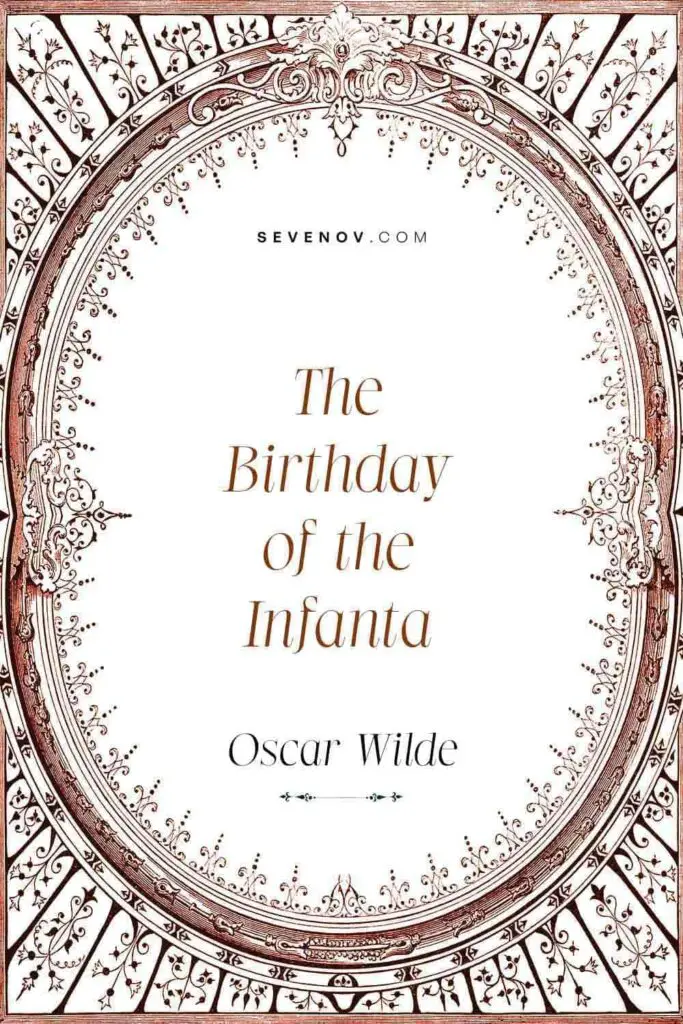
The Birthday of the Infanta by Oscar Wilde
Author: Oscar Wilde
Published: 1891
Genre: Fairy Tale, Short story
“The Birthday of the Infanta” is a short story by Oscar Wilde, part of the fairy-tale anthology, A House of Pomegranates, published in 1891. Other short stories in this collection are “The Young King,” “The Fisherman and his Soul,” and “The Star-Child.”
“The Birthday of the Infanta,” delves into the complexities of human nature and the tragic consequences of cruelty. Set in a fairy-tale world, this short story offers a thought-provoking commentary on the shallowness of appearances, the pain of isolation, and the profound impact of empathy.
1. The Birthday of the Infanta Synopsis
“The Birthday of the Infanta” is set in the kingdom of Spain during the medieval era. The story centers around the grand celebration of the Infanta’s twelfth birthday, where courtiers and dignitaries gather to honor the young princess. Amidst the festivities, an ugly dwarf is brought to entertain the royal household. Despite his hideous physical appearance, the Infanta is keenly interested in the dwarf.
As the story progresses, Wilde masterfully explores the stark contrast between the opulence and privilege of the royal family and the plight of the dwarf, who is considered a curiosity. Trapped in a world of superficiality and ignorance, the Infanta remains oblivious to the emotional turmoil she inadvertently inflicts upon the dwarf.
2. The Birthday of the Infanta Summary
The King of Spain has been a widower for almost twelve years, ever since the Queen passed away shortly after giving birth to their daughter, the Infanta. This tragic loss has left the King in a state of profound melancholy. He finds it difficult to gaze upon his daughter for extended periods, as she reminds him too much of her late mother. As a result, on the day of the Infanta’s twelfth birthday, the King decides to retire early from the festivities, entrusting the care of his daughter to her uncle Don Pedro and other esteemed courtiers.
On her birthday, the Infanta is filled with immense joy. Typically, she is restricted to playing only with children of her own aristocratic status, a limitation imposed by the absence of any royal peers in the kingdom. Consequently, she seldom has the opportunity to interact with anyone else. However, on this special day, she is granted the privilege to invite any children she desires to the grandeur of the palace. A splendid array of amusements has been meticulously arranged to captivate the princess and her esteemed guests.
The festivities commence with an enchanting mock bullfight, featuring skillfully costumed boys portraying both the matadors and the fiery bull. Subsequently, a delightful puppet show unfolds, accompanied by the harmonious melodies of a choir. A magician then takes the center stage, mesmerizing the audience with awe-inspiring tricks. To add a touch of exotic charm, Gypsy musicians grace the occasion, showcasing their extraordinary talents alongside a captivating performing bear and a troupe of mischievous monkeys.
Everyone agrees that the most captivating performer of all is a young dancing dwarf. Despite his physical differences, with crooked legs, a hunched back, and a large head, this unique individual caught the attention of some hunting courtiers in a forest just the day before. The courtiers were so intrigued that they decided to purchase him from his father, a poor charcoal burner who believed the boy to be of no value. What truly fascinates the courtiers about the dwarf is his complete unawareness of his own appearance. When children laugh at him, he simply laughs back with genuine joy.
At the end of his remarkable performance, the Infanta, inspired by her aunt’s generosity towards an Italian opera singer, throws a white rose at the dwarf. This act not only mimics her aunt’s gesture but also signifies the princess’s desire for him to dance for her once more.
When informed of the Infanta’s desire to see him dance once more, the Dwarf’s heart fills with joy. The gift of the white rose solidifies his belief that she must harbor feelings for him. Overflowing with excitement, he ventures into the garden, his imagination running wild. In his fantasies, he envisions a future entwined with the Infanta, yearning to share the wonders of nature with her in the forest. Determined to find her, he returns to the palace, eager to embark on this enchanting journey together.
After exploring numerous exquisite chambers with no sign of the Infanta, the Dwarf’s attention is caught by a peculiar sight at the far end of one room. To his astonishment, he discovers a monstrous figure mirroring his every move. An invisible barrier prevents him from reaching out to touch the creature, revealing its cold and impassable nature. As he continues to examine his surroundings, the Dwarf realizes that every object in the room has a duplicate counterpart, including himself.
A dreadful revelation dawns upon him – he is gazing upon his own reflection. In an instant, the truth unravels as to why laughter always accompanied his presence among other children. The realization strikes him with cruel force – the Infanta, too, was merely mocking him, void of any genuine affection. Unable to bear the heartbreak, he violently tears apart the delicate white rose, collapsing to the ground, consumed by sobs of despair.4
The Infanta and her esteemed guests stumbled upon the weeping Dwarf, initially dismissing his sorrow as mere theatrics and erupting into laughter. In response, the Dwarf gasped, fell silent, and lay motionless. Ignoring any signs of distress, the princess demanded that the Dwarf resume his dance. Don Pedro, growing impatient, threatened to whip him if he refused.
However, one astute courtier recognized that the Dwarf’s life had tragically slipped away, lamenting that his comedic presence might have brought solace to the somber King. Sharing this news with the princess, the courtier explained that the Dwarf would never dance again, his heart having shattered beyond repair. To this revelation, the Infanta declared, “Henceforth, those who dare to revel with me shall leave their hearts behind.”
3. Themes Explored
Oscar Wilde skillfully crafts his story, each contributing to the story’s overarching themes.
1. Beauty and Cruelty: Wilde delves into the theme of beauty and its relationship with cruelty. While the dwarf’s appearance is captivating, it becomes a source of distress as he encounters the cold and heartless behavior of the courtiers. The story highlights the shallowness of a society that values physical attractiveness over empathy and kindness. The courtiers’ indifference and callousness towards the dwarf reflect the heartlessness that can pervade the upper echelons of society.
2. Innocence and Ignorance: The Infanta represents innocence and purity, yet her lack of understanding and empathy for the feelings of others showcase the ignorance prevailing within the privileged class and the blindness that often accompanies privilege. Wilde critiques the aristocracy’s detachment from the struggles faced by those considered different or lesser in society.
3. Isolation and Loneliness: The dwarf’s isolation, despite being surrounded by people, serves as a powerful reminder of the loneliness that can accompany physical and emotional differences. His yearning for authentic human connection emphasizes the universal desire for understanding and compassion. Serving as a collective, the dwarfs represent the marginalized and those who face discrimination based on their appearances or differences.
4. The Illusion of Happiness: The Infanta’s genuine curiosity and momentary kindness toward the dwarf create an illusion of happiness for him. However, this happiness is short-lived, as she remains unaware of the true nature of his feelings. Wilde questions the authenticity of happiness derived from superficial gestures.
4. Enduring Significance
“The Birthday of the Infanta” remains a timeless tale that resonates with readers across generations. Wilde’s sharp critique of societal prejudices, the pursuit of beauty, and the illusion of happiness continues to hold relevance in contemporary times. The story encourages readers to reflect on empathy, understanding, and the consequences of actions driven by ignorance.
Moreover, “The Birthday of the Infanta” showcases Wilde’s mastery in blending the fantastical with the profound. The story’s fairy tale setting allows for a deeper exploration of human emotions and societal flaws, leaving readers both enchanted and moved by its poignant message.
5. Conclusion
Oscar Wilde’s “The Birthday of the Infanta” stands as a poignant reminder of the consequences of superficiality and cruelty in society. Through his enchanting prose, Wilde weaves a tale that explores the complexities of human emotions, the significance of empathy, and the repercussions of ignorance. The story’s enduring relevance ensures that it continues to captivate readers, inviting them to contemplate the true meaning of beauty, kindness, and the pursuit of genuine happiness.




